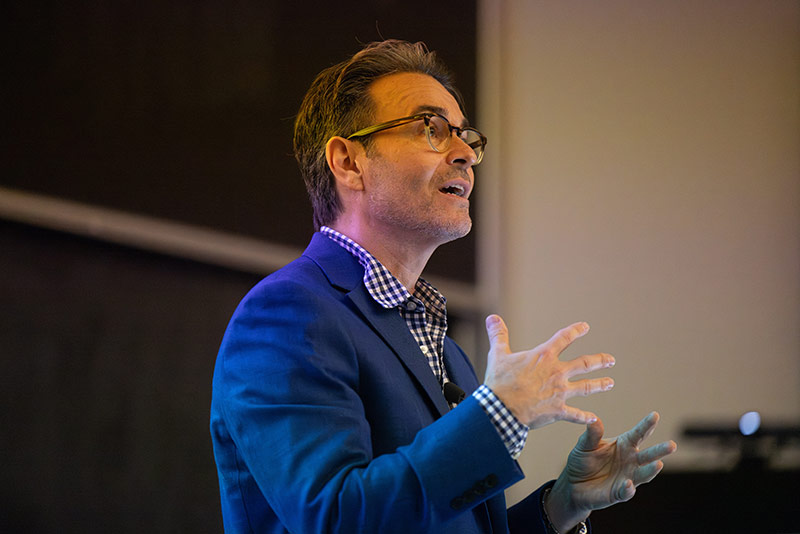Adrian Tout's journey: From UNB student to Google Maps innovator
Author: Angie Deveau
Posted on Oct 12, 2023
Category: UNB Fredericton

Adrian Tout, a University of New Brunswick (UNB) alumnus (MScE’97) and Product Partnership lead at Google, shows what can be accomplished by dreaming big, taking risks and pushing the limits of technology. Last month, he shared his story and insights at the launch of UNB’s department of geodesy and geomatics engineering seminar series.
During his lecture on Sept. 15, Tout delved into his success, experiences and knowledge gained after graduating from UNB more than 20 years ago.
“Even though I have an engineering discipline, my career is very much at the intersection of business and engineering,” he said. “I lead from the business side now, but it’s critical to have the engineering chops to help determine product market fit - and understand if what we're doing will be commercially successful.”
Tout described the evolving tech landscape spanning three major paradigm shifts - personal computers and the internet, to mobile computing and more recently, to artificial intelligence (AI).
He also talked about how, in the early 1990s, very few cars had navigation systems and his involvement with the business of creating navigable databases.
However, when Google Maps came out several years later in 2005, it began to change the game - taking mapping to a global scale - with very easy to use interfaces and APIs for developers.
He reminisced about when, pre-iPhone, he predicted that everyone would soon have access to GPS via mobile device, a prediction that has since become a reality.
He said it’s exciting to design products that can be scaled at a company like Google.
“What we do can potentially impact billions of users,” he said. “But that comes with a large responsibility, especially today with technology such as AI. This is something we think deeply about - where we engage with the community and industry experts - applying the guardrails of always trying to be useful and helpful. In that sense, Google’s mission today is the same as it was 25 years ago.”
But Tout's talk was not just about success stories; he also shared what he learned through some of the more difficult challenges.
For example, he talked about startups and how they require creativity, thinking differently, problem-solving skills and perhaps most important - the right timing. He said startups often carry a high risk of failure, but the rewards can be monumental.
Tout underscored the significance of engineering expertise and creative design skills in the tech industry.
“The best mistakes are those which are made early. The ‘gold' is found when you dig into anomalies - you do the hard work. Rarely will things work out how you initially envisioned,” he said.
“We are fortunate that we have access to thousands of talented engineers - with meaningful free cash flow. However, despite these resources, we will still make mistakes and that’s okay. That’s the only way we learn."
He also spoke about his involvement with Google’s former AR platform, Tango, a project he worked on for approximately four years.
Unfortunately, Tango was deprecated, which means the product is no longer recommended for use or supported. Even though the tech itself had various challenges and setbacks, it led to some incredible innovations (such as Google Live View and ARCore). He said that Google has deprecated approximately 280 products.
“Deprecating a product is always a carefully considered and difficult decision,” said Tout. “Tango was a possible solution to a very challenging problem. But learning from a failure - working through the anomalies - will typically lead to something better.”
Tout also shared some product innovation stories, including the evolution of online mapping, indoor mapping, Google AR and Lens.
“The way we use computing today is in the process of meaningful change. For example, computing is becoming a lot closer to how our natural senses work - what we call ambient computing. Google Assistant, Lens and AR are all great examples,” he said.
“Computing is far more immersive. Your phone can now understand what it sees. Now if your phone can perceive the world - it can augment it - helping to answer your questions in context. For example, ‘what is that I’m looking at?’ That’s a whole new search experience - powered by AI. Part of my job is working with an exceptionally talented team of people to help reinvent Search as part of this exciting paradigm shift.”
As the seminar series continues, UNB's department of geodesy and geomatics engineering promises to bring more speakers like Tout. These speakers will share their experiences, knowledge and passion for shaping the world through technology, providing inspiration for future generations of tech enthusiasts.
As Tout said, “Getting a business from zero to one is very hard. However, scaling it from one to ten can be even harder. It requires a lot of problem-solving abilities, creativity, different thinking and a healthy disregard for what we call the impossible.”
